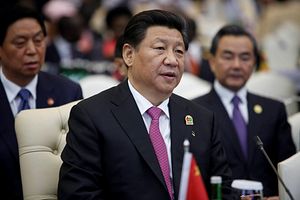Xi Jinping is in Indonesia for a meeting commemorating the 60th anniversary of the Bandung Conference. Over 100 representatives from different countries and organizations attended the conference, including 21 government leaders (out of an invited 109). There were a number of high-profile absences, including late cancellations by Indian Prime Minister Narendra Modi, Pakistani Prime Minister Nawaz Sharif, Sri Lankan Prime Minister Maithripala Sirisena, and South African President Jacob Zuma, according to The Jakarta Post. However, Japanese Prime Minister Shinzo Abe did attend, setting the stage for him and Xi to present their countries’ competing visions for the developing world.
In his speech, Xi recommended three steps for continuing the spirit of the original Bandung Conference (“solidarity, friendship, and cooperation”) into the 21st century. First, promote Asia-Africa cooperation by having countries on the two continents “align their development strategies and translate their economic complementarity into a driving force for common growth.” Not coincidentally, those are also the main goals of China’s Silk Road strategy. The Maritime Silk Road, which will include a stop in Kenya, in particular would expand links between Africa and Asia.
Xi’s second recommendation: “expand South-South cooperation.” Xi said that developing countries must “join their forces and march forward together,” a phrase that could refer to both economic development as well as political unity. China has been vocal about calling for more representation for the developing world in international bodies and clearly sees itself as a leader in that effort. Xinhua described the original Bandung Conference in 1955 as opening “a new chapter in the developing countries’ struggle for national independence, economic development, social progress and a more balanced international order” – all themes China continues to stress today in its diplomacy.
In an interview with Xinhua, China’s ambassador to Indonesia, Xie Feng, said that Asia and Africa should work together politically. African and Asian countries should “insist on equality and justice, increase the voice and representation of developing economies, and promote democratization, legalization and rationalization of international relations,” Xinhua paraphrased Xie as saying.
Finally, Xi called on Asian and African countries to promote “South-North cooperation” on the basis of “mutual respect and equality.” Xi emphasized that developed world has a “binding obligation … to help boost the development of their developing peers and narrow down the South-North gap.” In particular, he said aid provided to the developing world should have “no political strings attached.”
In terms of deliverables, China pointed to preexisting initiatives as its contribution to Asian-African development: the Belt and Road, the Asian Infrastructure Development Bank, and the Silk Road Fund. Ambassador Xie said that China’s new initiatives will provide a new push for cooperation between the two continents. “The China-proposed ‘One Belt, One Road’ initiatives will provide opportunities to Asian-African nations and contribute to Asian-African cooperation,” Xie told Xinhua.
Xi also said China would provide “100,000 training opportunities for developing nations in Asia and Africa in the coming five years.”
On the surface, Xi’s plan doesn’t sound all that different from Abe’s. In an interview with The Jakarta Post, Abe emphasized Japan’s role in promoting “the Bandung Spirit” in particular and the “peace, stability, and prosperity of the international community” in general.
Japan is also committed to investing in the development of African and Asian countries. Japan “will continue to contribute to the development of both Asia and Africa through support via ODA [Official Development Assistance], promotion of trade and investment under the partnership between the public and private sectors and human resources development,” Abe pledged. In his speech at the summit, Abe promised to “help as many as 350,000 people throughout the region acquire technology expertise and industrial knowledge” over the next five years.
Japan agrees with China on the need for infrastructure development as well, and Abe promised to promote “high-quality infrastructure investment” at both government and private sector levels.
While Japan and China’s strategies for Asian-African cooperation sound similar, in practice the potential for the two countries to collaborate is slim. China will pursue engagement with both Asia and Africa through the framework of its “One Belt, One Road” strategy, and Japan is hardly going to link its own outreach programs to a Chinese-led initiative.
Instead, Abe hinted at disapproval of China’s approach in his speech at the summit. “We should never allow to go unchecked the use of force by the mightier to twist the weaker around,” Abe said. “The wisdom of our forefathers in Bandung was that the rule of law should protect the dignity of sovereign nations, be they large or small.” That’s likely a veiled reference to China’s pursuit of its territorial claims in the South China Sea, which Japan has called a cause for concern.
Abe’s speech also contains no hints of the sort of South-South unity China likes to emphasize, much less the idea that the developed world has a moral responsibility to lift the developing world out of poverty and share international decision making power with these nations.
As my colleague Ankit noted, Abe and Xi met on the sidelines of the Asian-African summit, their second meeting in five months. It’s telling that these two heavy-hitters chose to attend a conference so many of their peers skipped – evidence of the seriousness with which China and Japan approach their relationships with other Asian countries and with African nations. And perhaps, it’s also evidence of the unspoken competition between the two countries – neither wanted to be left out of this particular chance to shape the legacy of Asia-Africa cooperation for the next 60 years.

































